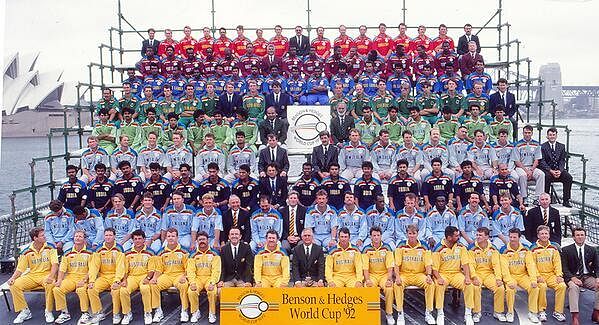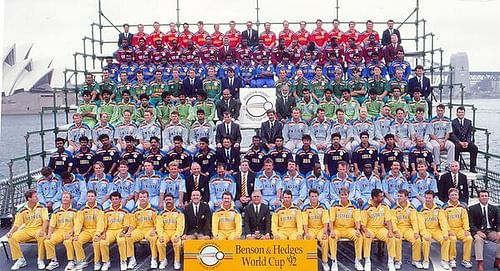
1992 Cricket World Cup: Reliving one of the greatest ODI tournaments

As the hype builds up for the eleventh edition of the ICC Cricket World Cup, which is less than a 100 days away, the tournament returns to Australia & New Zealand after a gap of 23 years when they last hosted the event in 1992. Notwithstanding the farcical end to the 2nd semi-final between England & South Africa, where a more common-sense approach by officials would have helped, to me it was one of the best World Cups hosted till date, format-wise. It was also the first ever World Cup played in coloured uniforms, with white balls and games being played under lights.
Firstly, we saw the innovative leadership of Martin Crowe who opened the bowling with an off-spinner and unleashed a “pinch-hitter” to open the batting in the form of Mark Greatbatch, who took full advantage of the field restrictions in the early part of the innings. Crowe, the batsman, was not far behind Crowe, the skipper, scoring 456 runs at an average of 114 and ending the competition not only as the top run-scorer but also running away with the Player of the Tournament award.
It was a tournament which reminded the world that while Viv Richards & Gordon Greenidge may have departed, Haynes & Miandad might have slowed down, but there was plenty of batting talent to excite the fans in the years to come with Inzamam-ul-Haq’s powerful stroke play, instinctive back-foot play of the gifted Sachin Tendulkar and the stylish batting of Brian Lara. And then there was another talented team to watch, as South Africa joined the list of competing nations at a world event after a hiatus due to Apartheid.
Here’s looking back at five of the best matches at the 1992 World Cup:
Australia vs New Zealand (Auckland)
Australia were expected to trample over New Zealand and they got off to a strange flyer. Craig McDermott, bowling two wides and then clean bowling John Wright round his legs off the first legitimate delivery of the tournament. What followed was a pure master class, a statement of sorts, from Martin Crowe.
A wonderfully crafted hundred & ably supported by Ken Rutherford, the Kiwis reached a total (248) which was defendable during those days. Aussie openers David Boon and Geoff Marsh, looking for easy pickings from the New Zealand medium pacers, were flummoxed at the sight of off-spinner Dipak Patel opening the bowling. Though David Boon fought a lone battle with a hundred, wickets tumbled at the other end and Australia, who were out thought, eventually fell short by a comfortable margin of 22 runs. This win for the Kiwis set their juggernaut rolling.
Australia vs South Africa (Sydney)
The very first delivery of the match saw Allan Donald steaming in aggressively off his long run up and bowl a snorter to Geoff Marsh. A thick outside edge escaped the umpire Brian Aldridge’s attention and Marsh survived. But that ball announced Donald’s arrival on the world stage and would go on to be known as White Lightening.
The South Africans bowled and fielded with determination and restricted the Aussies to a mere 170. Their chase was even more clinical, with Kepler Wessels, their skipper, who had represented Australia in the years gone by, showing cold-bloodedness of a boxer. It was a historic occasion for a team which was expected to lose, but played to conquer instead.
India vs Australia (Brisbane)
Two defeats in two games for the hosts and defending champions Australia left them gasping in the tournament. And in their third encounter at the Gabba, sight of a familiar opposition in India, whom they had tormented all summer, would have given them a glimmer of hope to come back in the event.
The Australian innings took a familiar shape with Dean Jones smashing an attractive 90 to catapult Aussies to a competitive 237 in 50 overs. However, the highlight of the innings was a stunning catch by Ajay Jadeja to dismiss Allan Border. Indian reply got off to a disastrous start with K Srikanth falling for a blob before the famous Brisbane thunderstorms interrupted the game for 12 minutes. Though the stoppage was not significant, it made a dent into India’s equation, since three overs were taken off their chase but only two runs were taken off the target.
Mohammad Azharuddin played perhaps his best innings of the summer, a counter-attacking 93 before Allan Border, who had only one stump to aim at, found him short of the crease. Sanjay Manjrekar played an unusually quick innings before being run out for the umpteenth time. With 13 required from the last over bowled by Tom Moody, Kiran More struck 2 fours in two balls before being bowled while attempting a third one.
Prabhakar took a single and with four needed off the last ball, Javagal Srinath swung his bat wildly only for Steve Waugh to drop the catch at deep midwicket. However, Waugh recovered quickly to throw at the striker’s end to find Raju short and eventually giving the Aussies a win by 1 run. It was a grandstand finish. For India, rain and quirky rules punished them which ironically saved Pakistan (bowled out for 74) against England at the Adelaide on the same day.
India vs Pakistan (Sydney)
Neither was this a great game of one-day cricket nor was it India’s finest victory over Pakistan, but it was easily the most satisfying win for India and in the context of the tournament, absolutely crucial. India & Pakistan were meeting for the first time in five World Cups.
Jadeja was refreshingly carefree as an opener and Azhar was in glorious nick. However, Indian innings stuttered after losing these two only to be resurrected through a finely crafted half-century from Tendulkar and a rampaging innings towards the end from Kapil Dev.
India’s total was modest, but the pitch was far from easy. Young Pakistani batsmen struggled against the swing, seam and cutters from Kapil, Prabhakar and Srinath. Javed Miandad attempted to intimidate first with his crude take off on Kiran More’s style of appealing and later with a dogged 40, but it wasn’t enough on the day as India eased to a 43-run victory over their arch rivals.
New Zealand vs Pakistan (semi-final, Auckland)
Pakistan entered the last four by virtue of that one point they earned during a washed out league match against England in which they were bowled out for 74, but there was no luck involved about their performance in the first semi-final at Eden Park. New Zealand, riding on a masterly 91 from their skipper Martin Crowe, ended their innings with 262 which looked like a match-winning score.
Pakistan were struggling after 35 overs at 140/4 and that’s when Javed Miandad signaled furiously towards the dressing room to send left-handed Wasim Akram. But Imran Khan sent a young Inzamam-ul-Haq and what followed is history. The then 22-year-old smashed 60 off 37 balls in a brutal display of hitting which left New Zealand players and supporters in a state of shock.
Pakistan won the game from nowhere and that too with an over to spare. Inzamam, whose name was a mere tongue twister 24 hours before, suddenly became known in every household which followed cricket. This game also highlighted the uncanny knack of Imran Khan, the leader, to pluck players out from obscurity and throw them at the deep end. New Zealand players were devastated and left in tears. They had captured the imagination of cricket lovers in this edition of the World Cup but had to be content with a consolation prize in the form of Player of the Tournament for their skipper Martin Crowe.
The 1992 edition of the World Cup had many moments which remain etched in the memory of all those who followed that tournament. Be it Jonty Rhodes flying like a bird to run Inzamam out or Sri Lanka becoming the first team to chase total in excess of 300 in a 50-over game or absurd rain rules leaving cricket fans puzzled when South Africa were left to chase 22 runs in 1 ball or those deadly in-swingers delivered around the wicket by Wasim Akram in the final to clean up Allan Lamb & Chris Lewis.
It was one of the most entertaining World Cups and let’s hope the next one coming up in Australia & New Zealand will leave a similar lasting impression on cricket fans all around the world.